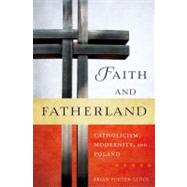Faith and Fatherland Catholicism, Modernity, and Poland
, by Porter-Szucs, Brian- ISBN: 9780195399059 | 0195399056
- Cover: Hardcover
- Copyright: 6/3/2011
Jesus instructed his followers to "love your enemies, do good to those who hate you, bless those who curse you, pray for those who mistreat you" (Luke 6:27-28). Not only has this theme long been among the Church's most oft-repeated messages, but in everything from sermons to articles in the Catholic press, it has been consistently emphasized that the commandment extends to all humanity. Given this, the history of the Church in the 20th century presents a puzzle, because on numerous occasions Catholics have established alliances with nationalist groups promoting ethnic exclusivity, antisemitism, and the use of any means necessary in an imagined "struggle for survival." While some might describe this as mere hypocrisy, Faith and Fatherland attempts to explain precisely how Catholicism and nationalism have been blended together. Poland, a country where religious and national identity would seem to correspond so closely, is an ideal site for exploring this issue. It is usually taken for granted that Poland is a Catholic nation, but in fact the country's apparent homogeneity is a relatively recent development, supported as much by ideology as demography. To fully contextualize the fusion between faith and fatherland, each chapter of this book explores a keyword in modern Polish Catholic rhetoric (concepts like sin, the Church, the nation, and the Virgin Mary), ultimately showing how these ideas were assembled to create a powerful but hotly contested form of religious nationalism. By no means was this outcome inevitable, and it certainly did not constitute the only way of being Catholic in modern Poland. Nonetheless, the Church's ongoing struggle to find a place within an increasingly secular European modernity made this ideological formation both possible and (for all too many Catholics) appealing.






